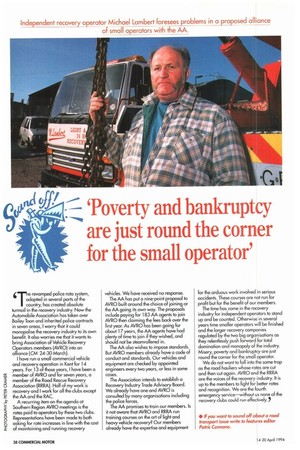'Poverty and bankruptcy are just round the corner for the small operator'
Page 46

If you've noticed an error in this article please click here to report it so we can fix it.
6 e revamped police rota system,
TI
adopted in several parts of the country, has created absolute turmoil in the recovery industry. Now the Automobile Association has taken over Bailey loon and inherited police contracts in seven areas, I worry that it could monopolise the recovery industry to its own benefit. It also worries me that it wants to bring Association of Vehicle Recovery Operators members (AVRO) into an alliance (CM 24-30 March).
I have run a small commercial vehicle and recovery operation in Kent for 14 years. For 13 of those years, I have been a member of AVRO and for seven years, a member of the Road Rescue Recovery Association (RRRA). Half of my work is recovery and I work for all the clubs except the AA and the RAC.
A recurring item on the agenda at Southern Region AVRO meetings is the rates paid to operators by these two clubs. Representations have been made to both asking for rate increases in line with the cost of maintaining and running recovery vehicles. We have received no response.
The AA has put a nine-point proposal to AVRO built around the choice of joining or the AA going its own way. The proposals include paying for 183 AA agents to join AVRO then claiming the fees back over the first year. As AVRO has been going for about 17 years, the AA agents have had plenty of time to join if they wished, and should not be steamrollered in.
The AA also wishes to impose standards. But AVRO members already have a code of conduct and standards. Our vehicles and equipment are checked by appointed engineers every two years, or less in some cases.
The Association intends to establish a Recovery Industry Trade Advisory Board. We already have one and AVRO is consulted by many organisations including the police forces. The AA promises to train our members. Is it not aware that AVRO and RRRA run training courses on the art of light and heavy vehicle recovery? Our members already have the expertise and equipment for the arduous work involved in serious accidents. These courses are not run for profit but for the benefit of our members. The time has come in the recovery industry for independent operators to stand up and be counted. Otherwise in several years time smaller operators will be finished and the larger recovery companies regulated by the Iwo big organisations as they relentlessly push forward for total domination and monopoly of the industry. Misery, poverty and bankruptcy are just round the corner for the small operator.
We do not want to fall into the same trap as the road hauliers whose rates are cut and then cut again. AVRO and the RRRA are the voices of the recovery industry. It is up to the members to fight for better rates and recognition. We are the fourth emergency service—without us none of the recovery clubs could run effectively./


























































































